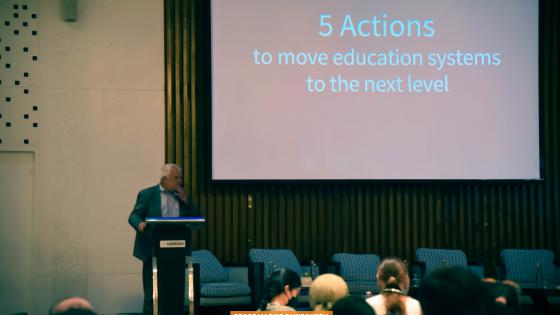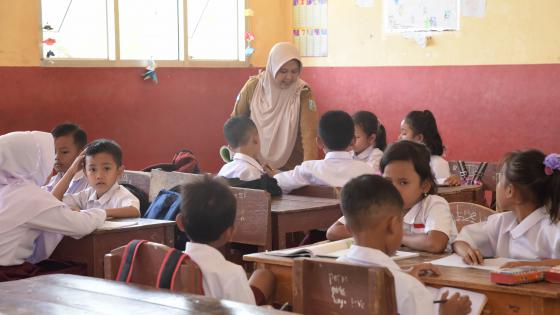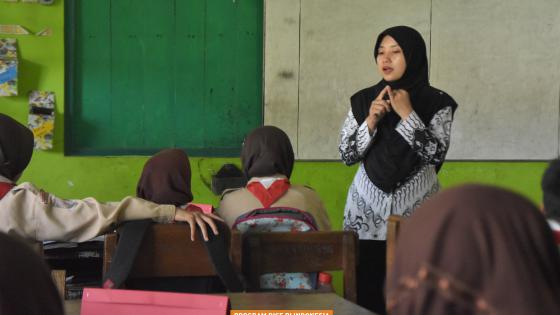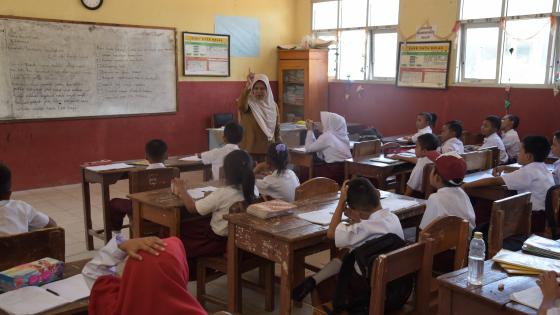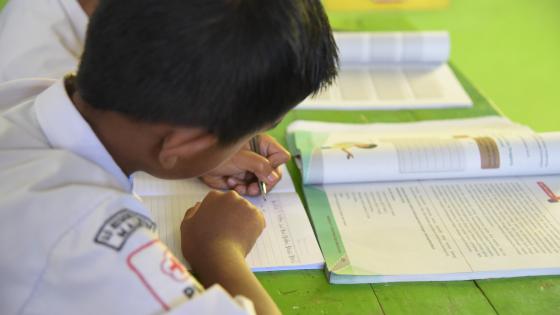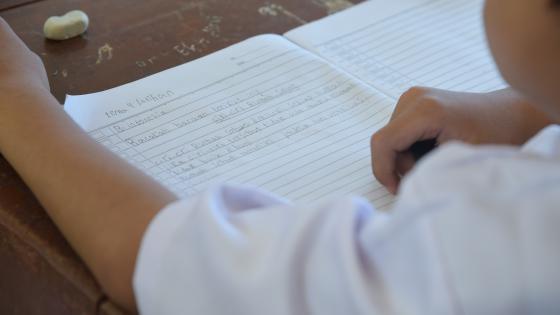Illustration: Tony Liong
![]()
-
This article was originally posted on The Conversation Indonesia and has been translated by RISE team.
-
The success of Indonesian students in winning various international science olympics is exciting news.
Outside the competition, the result of international tests such as the Programme for International Student Assessment (PISA) in 2015, which placed Indonesian students in 62nd place out of 70 countries, was sad news indeed. Since participating in this test in 2003, Indonesia has not made any significant progress.
How sad it was that 75% of Indonesian students failed to achieve basic mathematics skills, even though the state budget allocation for education has doubled over the last fifteen years—which has been dubbed “double for nothing".
Meanwhile, after participating in the 2012 PISA, Vietnam immediately entered the top-20 group and, in 2015, advanced to eighth place. In fact, Vietnam was only united in 1976 after experiencing a war that claimed the lives of not less than a million civilians and resulted in a massive exodus of the population. Since several years ago, Singapore, South Korea, and Japan have always been in the top-ranking group of PISA participants.
In Indonesia, the recent national exam results of senior secondary school level in East Java, for example, have been in the spotlight as the percentage of students who scored below 55 reached 78.8%, while the minimum competency standard is 55. This means that the majority of students' scores are below the standard.
Mastery learning
The results of an education research in 2016, in which I participated, as well as the preliminary results of our ongoing study in Research on Improving Systems of Education (RISE), indicate that one cause of the low quality of teaching in Indonesia is related to Competency standard is a statement about the knowledge, skills, attitudes and mastery that students are expected to achieve in studying certain subjects. Basic competency is a description of competency standards in the form of minimum knowledge, skills, and attitudes that must be achieved by students as a real picture of their mastery of competency standards.
Mastery learning is a teaching and learning process that implies students master all competency standards and basic competencies for each subject well.
Competency standard is a statement about the knowledge, skills, attitudes, and mastery that students are expected to achieve in studying certain subjects. Basic competency is a description of competency standards in the form of minimum knowledge, skills, and attitudes that students must achieve as the actual picture of their mastery of competency standards.
Conditions between schools and quality between teachers vary with a large gap of inequality. Therefore, schools, particularly teachers, may determine a reasonable mastery limit of minimum basic competencies according to their respective conditions. The further the limit for mastery learning below 100%, the more likely it is for students not to master the various basic competencies of a subject.
Based on my interviews with school supervisors in several regions in Indonesia, there is general agreement on the limit of minimum mastery learning: 75% for individuals and 85% for groups. These agreed figures still have a risk in ensuring that students have mastered competency standards in science. In fact, some schools set the limit of minimum mastery learning below 75%.
To diagnose outcomes of mastery learning, teachers need to regularly evaluate each basic competency that has been taught. Students who have completed the mastery learning may continue to the next basic competency and can even take part in enrichment activities. Meanwhile, students who fail need to take part in remedial activities to improve the subject matter and even improve their way of learning. The results of the diagnosis of the learning process can also help teachers improve their teaching methods and complete learning materials. The mastery learning strategies require both students and teachers to be independent learners.
Does it really take hundreds of years?
It is certainly difficult for schools and teachers who are already familiar with the conventional teaching process to exercise the mastery learning strategies. Mastery learning entails schools and teachers carrying out many activities that require the support of mastering various skills, such as philosophy, objectives and curriculum materials, assessing student abilities based on evidence, and helping to improve student learning outcomes.
Without these skills, several steps required for mastery learning are often neglected. For example, teachers do not always prepare complete and comprehensive lesson plans. Examination results are not analysed, while incomplete mastery learning outcomes are left without remedial tests.
In fact, incomplete mastery learning of basic competency in certain parts of the lesson, if not followed by a remedial test, will make it difficult for students to master the next basic competency. The more incomplete mastery learning is left as it is, it almost certainly will result in low learning outcomes. This situation is further intensified by the fact that the teacher treats students as a homogeneous group in the classroom. In reality, the ability to understand lessons and how each student learns varies.
Learning outcomes will be increasingly difficult to improve when schools and teachers do not pay close attention to mastery learning. Particularly when it comes to the fact that most of the approximately three million teachers did not pass the teacher competency test. As long as education in Indonesia does not pay enough attention to ensure a mastery learning process, efforts to improve teaching outcomes will be hard to achieve.
The failure of education to complete learning mathematics, language, and science to date, in essence also illustrates the failure to educate character education. If characters such as hard work, collective and social behavior, and honesty in taking the exams are successfully educated, then the subject matters will be easier to teach.
According to Lant Pritchett, Director of RISE, with the pace of development of teaching quality to date, Indonesia needs hundreds of years to match the scores of the highest-ranked PISA participating countries. However, provided that the quality requirements of master learning are completely met, within one year, Indonesia can increase points by 48.
The above picture shows the position of Indonesia's PISA among all participating countries conducted on 15-year-old students. A score of 410 is the lower limit of mastery of basic knowledge, which is being able to simply apply procedural skills to everyday life.
Is mastery learning a luxury?
Those who become champions of the international science olympics are students who have the opportunity and luxurious facilities to go through their mastery learning. With such luxuries, all students, including students with disabilities (the deaf, blind, speech impaired), can also achieve optimal learning outcomes. In reality, many Indonesian students who have not completed the mastery learning, which results in low learning results.
When they grow up as adults in the future, today's schoolchildren will face the rapid changes in global life. For example, it is estimated that 65% of the current job occupancies will be replaced by new types of jobs that are currently unimaginable. If Indonesian students cannot compete in international tests, most of them will be marginalised from global society in the future. They can become second-class citizens in their own country.
Education and teaching are the main determinants of the welfare of a nation in the future. A small group of students who have experienced mastery learning, some of whom may win an international science olympics, can succeed in building Indonesia. However, when a large part of the population still "suffers" from incomplete mastery learning, it is only natural to worry about a prolonged situation of severe socioeconomic inequality.
As a matter of fact, Indonesia's independence aims to open up space for every citizen to develop themselves to enjoy mutual prosperity. We must continue to nurture an optimistic attitude as the proverb teaches us that "there is no tangle that cannot be unraveled."


